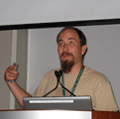
Northeastern University Marine Science Center 430 Nahant Road Nahant, MA 01908 (781) 581-7370 e-mail author
Delivered at 2008 Boston Harbor Islands Science Symposium.
Rocky intertidal communities of Acadia NP and Boston Harbor Islands NRA provide critical habitat to marine and terrestrial species and are popular places for park visitors. These habitats are threatened by a variety of stressors including climate change, invasive species, pollution, and human trampling. Unfortunately, we currently lack baseline data on the health and natural variability of these communities and, thus, are unable to predict the occurrence and consequences of such environmental changes. Thus, our goal is to develop a long-term, low-cost protocol that will detail procedures for 1) monitoring selected indicator species and 2) correlating changes in species abundance with changes in environmental stress. We model our approach after the successful MultiAgency Rocky Intertidal Network (MARINe) on the west coast that currently surveys 80 rocky intertidal sites including four national parks. We will survey species abundance with the assistance of a large volunteer group (including the public and NPS staff) and data will be stored in a database linked to MARINe. Our multidisciplinary approach allows for both small- (within park) and broad-scale (between coasts) comparisons using techniques of marine ecology, physical oceanography, and the study of climate change. In addition to providing important baseline research, our project will educate the public through volunteering and assist park managers in meeting park performance goals. |
Last updated: February 26, 2015
